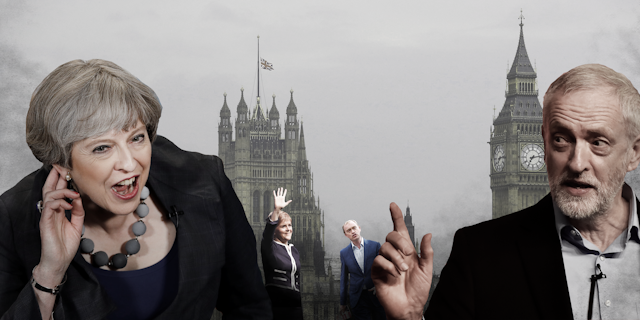Beneath the sudden, heightened security of the campaign due to terrorist attacks in London and Manchester, the UK general election is a tale of difference: different leaders, different campaigns, different classes and different nations.
Different leaders
This has not been the easy run for the Conservatives that was anticipated when Prime Minister Theresa May called the June 8 election in April.
Whether we like it or not, UK elections are highly focused on leaders. May and Labour leader Jeremy Corbyn are two English archetypes: the tweedy vicar’s daughter and the earnest left-winger for whom wearing a corduroy jacket denotes a certain sort of radicalism. Their policies and styles are very different.
Initially this was May’s election: she called it, seized the initiative and dominated the early stages. She began at a comfortable (and slightly triumphant) canter.
But she has not had a good campaign. When she warned colleagues some years ago that people saw the Conservatives as “the nasty party”, she clearly knew what she was talking about. The so-called “dementia tax” floated in the party manifesto re-ignited people’s fears of harsh Tory social policies and alienated core constituencies.
Despite everything, the Labour Party – or perhaps Labour “parties” given the profound divisions within it – soon gained on her. Labour’s polling under Corbyn improved.
But this is not just a two-horse race. In Scotland, Scottish National Party leader Nicola Sturgeon has been negotiating the Scylla and Charybdis of Brexit and independence. Liberal Democrats leaders Tim Farron is hoping for a second coming for his party based on seeking the softest Brexit possible.
Without Nigel Farage at the helm, the UK Independence Party appears like a rudderless ship about to disappear down the plughole of history, a victim of its own Brexit success.
Different campaigns
One event that campaign strategists will reflect on is the bizarre “debate” in which the host and the studio audience posed questions to the two leaders – but the leaders didn’t actually speak to each other.
This event epitomised the parallel universes in which the Conservative and Labour campaigns talked past each other. May’s no-show in the next leaders’ debate was little better. None of this looked like the “strong and stable government” promised by the Tories.
The Conservatives were best when sticking to Brexit and repeating the “strong and stable” mantra (again and again). Labour was better when talking about the things of most concern to people’s immediate lives and wellbeing.
Then there was the terrorism. It is not clear what effect the attacks in Manchester and London will have on the outcome of the election – we won’t know until post-polling research has been done. Incumbents usually get a small boost from such attacks. But two attacks during one campaign may further dent the Conservatives’ claims to offer “strong and stable government” and affect voting in unpredictable ways.
Different classes
For all the early talk about the Conservatives smashing Labour, one of the main motivations for launching this surprise poll was for the Tories to regain the 4 million votes won by UKIP in 2015 – largely assumed to be white, working-class males.
While negating a threat to their right, scooping up former “Ukippers” may not deliver many seats to the Tories.
The main campaign focus has been on those traditionally working-class Labour seats that voted strongly for Brexit. But getting ex-Labour Brexit voters still wary of the “nasty party” to vote Conservative won’t be as easy, as the tightening polls suggest.
Different nations
Brexit also illuminated national divisions in the UK. These are still playing out in this election.
It is important to focus on the result in Scotland. Even if the SNP loses seats – a likely outcome given that it holds 95% of them – a large SNP majority in Scotland facing a Conservative majority in England will set the two nations on different political paths as Brexit negotiations begin in earnest.
Similarly, the result in Northern Ireland could shape the future of the United Kingdom. If nationalist parties, notably Sinn Fein, do well, this could affect the Brexit negotiations. Ireland remains in the European Union and EU negotiators have pledged to uphold Ireland’s interests.
Where to from here?
Another aim of the snap poll was internal to the Conservatives: to mute the voices of hard Brexiteers on the backbenches. A poorer-than-expected result might embolden malcontents and make internal party dynamics during Brexit more complicated than party leaders want.
For Labour, it could be a case of “carry on Corbyn” (or someone like him). If “Jez” gains more than 30% of the vote, he will have done better than his two predecessors. Much of his success will depend on how many young people who say they will vote Labour actually turn up and do so.
Of course the jury is still out on whether election campaigns make any difference to the way people vote when behind the polling booth curtain. Don’t we all ultimately vote like our parents?
But the volatility in recent voting behaviour means that this election is still more unpredictable than in the good old days of stable allegiances, values and attitudes.
It is unlikely that voters will “make June the end of May”. But a poor campaign by the Conservatives hasn’t helped their cause, and has weakened the prime minister’s standing.

